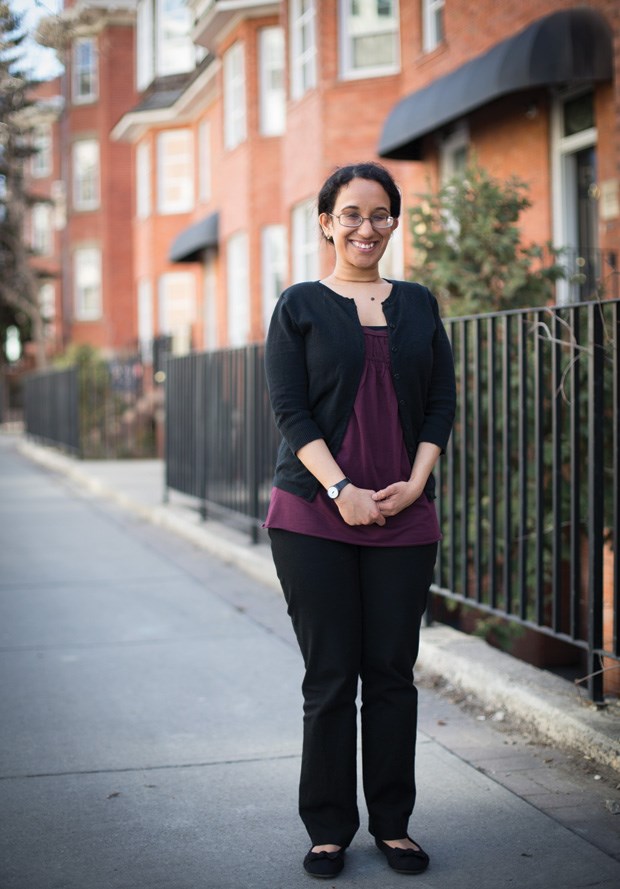Calgary resident Joey Chopra has never known full vision. At the age of two, she was diagnosed with several eye disorders and she grew accustomed to seeing a doctor of optometry regularly. But she didn’t appreciate the full importance of those visits until one routine checkup proved vital in saving what little vision she had left.
Born in India, Chopra had particularly small eyes (a condition called microphthalmia) as well as a rare genetic disorder called Peters’ anomaly, which is characterized by a hazy or whitish cornea. Though she had very little vision in her left eye and could only see a short distance with her right, Chopra could read books and watch television with the help of prescription glasses.
At age 12, during her annual checkup, Chopra’s eye doctor discovered she had glaucoma, an eye disease most often caused by built-up pressure in the eye, which can lead to damage to the optic nerve. The disease can lead to blindness, and is known as “the silent thief” because it often attacks the eyes without any initial symptoms.
“[Glaucoma] wasn’t something we were looking for,” Chopra says about her diagnosis. “Then we found out my eye pressure was higher than normal. We were very lucky we caught it when we did.”
Today, at 27, Chopra uses eye drops to alleviate the pressure in her eyes. Although she is considered legally blind, by wearing glasses she can still go about her day-to-day tasks with her remaining sight.
In fact, she has accomplished a great deal despite her limited vision.
Chopra’s family moved frequently when she was growing up – from India to Australia and then to Cyprus. They eventually moved to the United States, where Chopra earned a bachelor’s degree in international relations and communications at a women’s college near Boston, before the family finally settled in Canada.
Soon after, Chopra decided it was time to live on her own.
“Living by yourself is very different,” says Chopra. “It was a big decision for me and it was scary.”
A doctor of optometry who examined Chopra realized the daily challenges she would face living independently and referred her to CNIB, a charity that provides support to Canadians of all ages who are blind or partially sighted.
Initially, Chopra took mobility lessons with a CNIB specialist, who showed her around the city and helped her take the bus until she was comfortable doing it herself. Within a short time, though, Chopra was benefiting from a host of programs offered by the organization.
She had never cooked for herself before, and was worried about her safety when it came to a task like chopping vegetables.
“Because of my vision, it can be stressful using knives,” Chopra says. “It’s easy to miss things and you can end up hurting yourself.”
A CNIB specialist came into her home and taught Chopra safe meal preparation techniques. She also took career counselling courses at CNIB that strengthened her interviewing and resume-building skills, and helped her land a job as a communications coordinator.
Chopra says CNIB not only helped her improve her professional skills, the organization gave her enough personal encouragement to counter any doubts she had about her abilities.
“When I came to Canada and accessed their services, I felt really supported and confident I could do things myself just like any other person,” she says.
After earning her master’s degree in public policy at Simon Fraser University, Chopra now works as a research coordinator at an environmental non-profit organization in Calgary. She hopes to eventually complete her PhD in women’s studies, and is especially interested in developing policy to mitigate violence against women.
She says the skills she learned at CNIB have stuck with her and continue to help her live and work independently.
“I have absolutely found them useful,” she says. “They’re skills that you keep with you. They become part of your daily life.”
Still, despite the fact that she’s been able to build an independent life with very little vision, Chopra is quick to point out the importance of avoiding eye diseases that can lead to vision loss.
Knowing her glaucoma could have stolen her remaining sight had it not been detected, she warns others to get their eyes checked regularly by a doctor of optometry: “Diagnosing glaucoma early is very important – then you can make sure your sight doesn’t deteriorate,” she says.
May is Vision Health Month. Learn more at eyesareforlife.ca.



